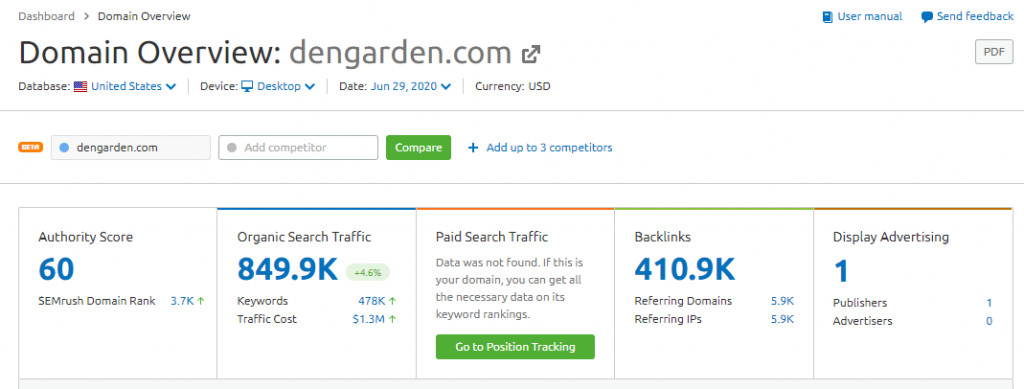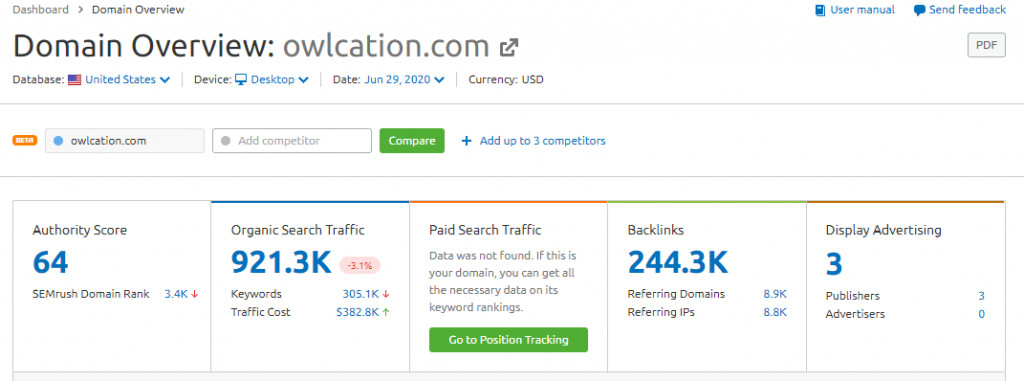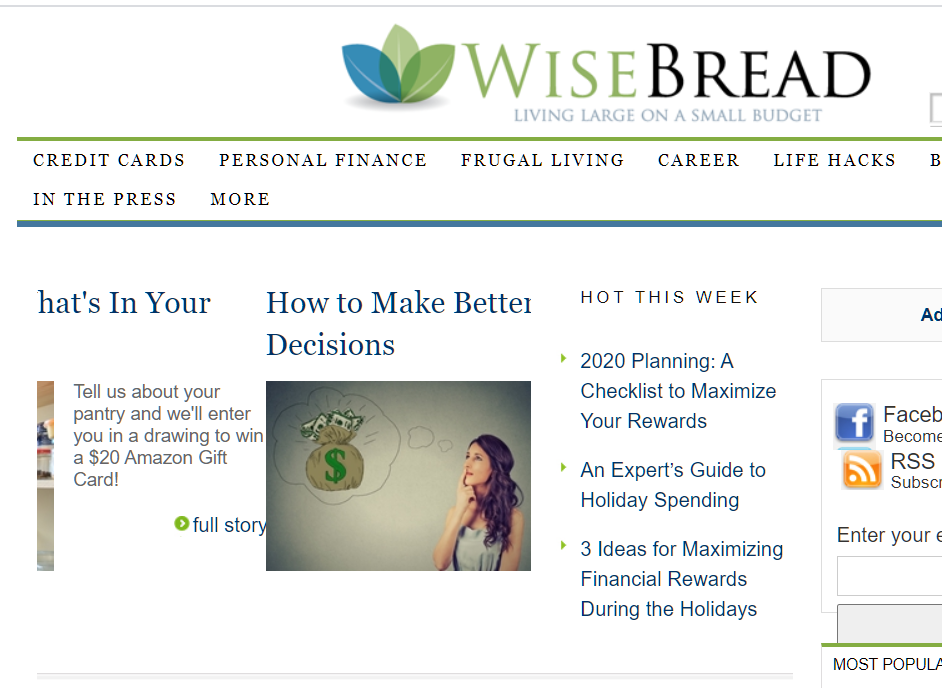Product removed "must provide relevant experience"
- Jessica Holbrookposted 5 years ago
0
I just received an email notification that products were removed from one of my hubs because I "must provide relevant experience." One of the products that was removed is one I have used for a long time and mentioned my experience in the hub. Do we have to go into great detail about our experience or something?
Not really. However, if it was a capsule, you could try putting it back in as a text link. They seem to work better and then can appear within the writing in a natural way.
They may have missed where you mentioned your experience, make sure it is prominent and right above the ad
- Marisa Writesposted 5 years ago
0
As others have said, make sure your explanation of your experience is above or below the product, not separated from it. Also, they seem to dislike capsules now, so use an in-text hyperlink instead.
- Jessica Holbrookposted 5 years ago
0
Thanks everyone! It's been awhile since I updated my hub so I was not aware that they didn't like capsules for products anymore. I'll add a link and see how that goes

I've never had a problem, even if I didn't have experience of a product. You just have to write the accompanying text to the ad as though it seems you have.
If you use Amazon capsules instead of text links, then it’s helpful to put your Information about your experience in the capsule, not above or below it. I use that method and never had an Amazon capsule removed, even when I have several ad capsules. If you place an empty Amazon capsule in your hub displaying only the item with no personal content, it might look spammy and get snipped.
- Will Apseposted 5 years ago
0
It is pointless to say anything unless you can see the page. Pages orientated to products should be fine for amazon ads. All other pages should be free of them.
Totally disagree. If you are writing for the reader, and not yourself, you can put together an informational article and include an advertisement for a product that can help.
Marisa gives an example that you can understand. I can give you another example. I have an article on skin diseases. In the article, I discuss which types of shampoos are best for each skin disease. I include a link so that the reader can purchase from that site if he or she wishes.
Write for the readers benefit. You may like the results.Again, its not worth the risk.
This site must be one of the last on the internet to try to monetize non product-orientated pages with Amazon ads.
Every time I use Google search, I scan the pages that I visit for signs of what works for Google and what does not.
Amazon ads are never present on non-product pages. Except here.So, what about all the other advertisements on every hub? I just clicked on a random hub - I see seven ads, plus one fast-changing carousel displaying even more.
One Amazon text link is hardly likely to overshadow a 2k word article."Not worth the risk" to provide a link that can help your reader? Not sure what you have noticed on Google, but I have about 60 pages that are at the top spot (or featured snippet) on Google. Most of them have Amazon ads if they have a product that can help with what I am writing about.
Google does not mind this. Amazon ads are all over the internet on non-product pages. Everywhere, not just here.On the contrary, I see them all around when I look up stuff related to gardening or aquariums, not when I look up physics stuff of course.
Ok, I would love to see some search terms that are not for products and lead from Google search to Amazon ad monetized pages.
So you're saying Dr Mark and Lobobrandon are lying?
A 1,500-word article that has one Amazon link in it is not an "Amazon ad monetized page". It's a useful article answering the searcher's question and recommending a product that will help the searcher solve their problem.
If those two are finding that they're making sales on Amazon links in informational articles, then I dont see how you can argue with that.Being wrong can involve lying. But usually it doesn't. Being wrong is simply being wrong.
Can't imagine Lobobrandon or DrMark are lying....so when they see the evidence with their own eyes on their own Hubs, they are wrong?
I have asked people to present the evidence. Where are the Amazon monetized pages that Google will take you to that are not directly related to product searches?
I must have made hundreds of thousands of Google searches over the last few years and only noticed a couple.
You can argue that Amazon ads do not harm HP sites if you want to. You cannot argue that using them is any way commonplace or normal. And that should tell you something about the way that publishing works.
Either publishers find Amazon ads counterproductive on info pages or Google will not present those kinds of pages to searchers.
Anyway, keep your eyes open all. If you come across an Amazon ad on a pure info page (that is not HP) post the search term here so that we can all make the search and see the wonder.
I cannot see how this is wrong. Are you thinking that eliminating the Amazon link will improve the article in Google´s eyes and lead to more traffic?
If my article has an Amazon link, and is the number one on a search, I do not see how Google is able to make it any more enticing for the potential reader/searcher.The issue got slightly confused. What you asserted and what Lobobrandon asserted were two different things.
Marisa rolled them into one.
I think I will take this whole debate slowly and simply seek to establish the basic fact that Amazon ads are almost never found unless unless you are undertaking a product search.
Once that is established, people can ask if spraying them around HP pages is harmful or helpful.
If they want to, lol.I think I made the same point as DrMark, but that's irrelevant, I did a simple search for setting up an aquarium substrate, the first thing that came to mind because I was looking at my aquarium and I came across this page https://www.buildyouraquarium.com/setti … -aquarium/ loads of amazon ads.
You should note that Amazon is one of the worst affiliate programs out there and this is before the recent changes, so a lot of the people use affiliate tracking codes directly leading to the seller. So not seeing a lot of Amazon does not imply there are no affiliate links on those info pages.I just checked the first 10 results for the search term "Planted Aquarium". The page you mentioned did indeed appear. It was number 7 which is perfectly respectable. Well done for that.
Having said that, aquariums are products and can only be maintained with multiple products including the planting.
The whole area has been much targeted by spammers and SEO link manipulators for years but the content on that site is very good.
None of the other pages in the search results had Amazon ads.
I strongly suspect that your referenced page has its place because of the product-heavy nature of the subject, quite possibly manufactured backlinks (the domain has nearly 10000 incoming links) and the age (2008).
It is actually a good example of an exact match domain which has managed to survive Google's anti-spam onslaught on the basis of high quality content and, probably, determined but careful offpage SEO.
It is a rarity, always in peril of penalties. I doubt the page would get any traction if published now.
It is not a model for writing about genuinely non-product orientated pages, here.
Still hoping for a genuine non-product page to appear.
- Marisa Writesposted 5 years ago
0
I can't agree, Will. Most of my Hubs are not "orientated to products" but I have approved Amazon links in them.
For instance, a Hub about managing blisters, corns and other foot issues in ballet. I recommend only one product in that whole Hub in the "blisters" section because it's a particularly good product. I don't have any products in the other sections, linked or otherwise.You have never got Amazon and never will. Neither do many editors, if it is any consolation.
It is all about search. Is the person looking for a product or information?
If someone is looking for a product, search engines will not penalize Amazon links. If a person merely wants info, Amazon links are spam.I thought you were saying that Amazon links would not be approved. However I'm still not sure I agree with you.
The other side of the risk this the earnings, I make about half my money off Amazon even at the new low rates. I am not in a hurry to give that up.
And i would dispute that -- as others have said, I rarely search for products and quite frequently see Amazon ads.
But more importantly, the ads I put on my hubs earn very well. I have them on only a few of my nubs but they earn as much as the Hubads on all of them put together.
I think the take home message is: Amazon adds work great when used in the right context.
Comne of the most successful hubs are ones that help people do something like learn a skill or solve a problem, and products are quite often an integral part of them.
All it takes is for the reader to go to there product link, and anything they buy on that visit gives you a share.Same, 90% of my amazon earnings come from two hubs and until last month Amazon was consistently 50% of my earnings.
Well please post examples. I am not asking people to go out of their way on this. The next time Google search takes you to a page with an Amazon ad, it would be helpful if could post the url and, if possible, the search term.
If it is relevant in the hub or the article then it would stay. Editors are well experienced in deciding that.
- Will Apseposted 5 years ago
0
Dunno if people have lost interest in this issue, but I might give the thread a bump from time to time because I think it is important.
What we really need is:
new pages getting traffic.
older info-only pages seeing a return to their former highs
product-orientated pages with Amazon ads not suffering from misuse of Amazon ads elsewhere
That means good site authority and zero spam filter penalties. - Will Apseposted 5 years ago
0
One more bump.
Is it ever a good idea to use Amazon ads on newly published pages?
The network sites just about qualify as aged, Even so...
The conventional wisdom of the (recent) past is that first, a site gets authority, then it monetizes through Amazon or other affiliate programs,
Older pages transferred from HP to the niches have done fine. New pages have struggled for traction. There might be a reason.Pages take time to age, older pages have a 301 redirect therefore they are already aged and did well. The pages I wrote early in 2019 did not do well with that summer, but they did amazingly well this year. The same with the ones I published this year. They are already on page 1, but not on the top spots yet, but they are steadily climbing.
Everyone I know who creates websites and I do know of a lot because I am on many groups on FB monetized their content right from day one. I wonder what makes you think that the conventional wisdom is otherwise.SEO land is place of such shifting mists and dubious evidence-free claims that no one should take anything arising from it too seriously.
On the other hand, there is absolutely solid evidence that very, very few publishers use Amazon ads on non-product pages.
That can only be explained in one of 2 ways:
The ads give a poor financial return (visitors do not use them).
Pages monetized with them do not do well in Google search. Or, to put it another way, Googles algo sees them as spammy.Wrong on both accounts, unfortunately. Many here have claimed otherwise but you don't want to belive it or argue with facts, just your opinion on what you believe all of us are seeing but we are lying about or failing to see things as they are.
What are you really trying to achieve on this thread? Do you want people to come in and say yes our articles are doing just as bad? An article I published last month is getting me a few hundred views a day, some may call this successful, but I like my hubs in this category to get close to a thousand, this will take time until the algorithms can figure out where my article needs to stand based on a lot of factors, internal links itself takes weeks to crawl and some times months.I think we have quite a lot of evidence that Dengarden is doing well at present.
If we can keep the conflict levels down, we might tempt others to contribute and get a broader picture.
Owlcation is one of my concerns. Traffic levels seem to be very poor. I don't think it is entirely down to schools closing.
This is a search for Amazon capsules on Owlcation via the phrase "buy now":
https://www.google.com/search?q=site:ow … mp;bih=578
A gardening site may support many product pages, but an educationally orientated site?
There are 300 pages with Amazon capsules! How many have in-text links?I don't see any conflict happening, Dengarden is doing well, Pethelpful is doing well. I honestly do not see your question though. Owlcation is not doing very well but better than most of the other niche sites. I have SEMrush and can see how niche sites are ranking, etc.
I still stand by you being wrong on both accounts above. Amazon won't hurt us, the pop up ads will. If we had hubs like the Squidoo list of amazon products those would not rank at all.If you don't care about Owlcation, that is fine. But there are people who do. It is also, worth remembering that Dengarden is not bulletproof.
With the current low returns on Amazon ads it might be worth an experiment with Owlcation. Clear out all the Amazon ads that do not produce regular sales. Or perhaps get rid of all of them. See if it helps with traffic.
Get a baseline. Check the income from before and after.Just so you know I got hubs on Owlcation. That site does not do well because it's got too much under one umbrella. Split them into more niche sites, it's not an Amazon issue.
Just so you know, Owlcation gets more traffic than Dengarden. Stuff does not rank that well though due to it not being niche enough.You keep saying you've got solid evidence to the contrary but I'm not seeing any.
Personally, I will believe the Hubbers saying they are making money on Amazon ads on informational Hubs. That's experience and that's what counts.If anyone can come up with a few sites that use Amazon ads in the same way that the network sites do, I will be impressed.
I might be reassured by just a few. I have never seen any.
The easiest way to discover what Google sees as good practice is to examine the pages it takes you to.I gave you one search term with many the other day. Not going to contribute to this thread anymore, good luck with your witch hunt, I hope you find what you're looking for.
So no link and no sites beyond the aquarium site which is in a product heavy area? Okay.
We have learned quite a lot from this thread. Some good things, Some not so good.
Dengarden seems to be in fine health.
Owlcation not so much.
Nobody wants to talk about the the other sites, which is a shame.
Writers are like most people. They perceive the world in a way which suits their needs. Hard facts that contradict their views are simply ignored. This is both normal and shocking, lol.
There are probably no other sites relying on Google search that use Amazon ads in the casual way that they are used here.
Ads on product pages are common enough, usually in special product related sections. They are kept off the info pages.
As a footnote, it is interesting to see that some SEO cults are still functioning.Some stats for you:


I am not surprised by your lack of research capabilities on this topic that you do not know much about SEO, you probably know it as keywords and backlinks. Nothing wrong about not knowing something, thinking you know it all when you do not is called the Dunning Kruger effect and it affects everyone in something or another. For you it seems to be SEO: https://www.youtube.com/watch?v=GJz66wm95-M
Some websites that rank with amazon ads (You should also know that Amazon is not the only affiliate program people use, you need to take a look at the link structure).
How to unclog a drain: the first two results had amazon links
https://www.wisebread.com/10-really-eas … log-drains
https://crunchybetty.com/clean-your-dra … a-vinegar/
Is this another product heavy area? Almost all my searches seem to be product heavy areas then, because I like many others here have seen amazon ads all over the place.
If this counts as a product heavy area, what niche are you talking about, and do you see amazon ads on hubs in these product absent areas? If so and they are unrelated why not report the hubs in question?
Just go to semrush.com as I said, don't be lazy.
Owlcation is a mishmash of a site. I'm not surprised if Google dislikes it, whether it has Amazon capsules or not. It is supposedly about education, but it can't decide whether it wants to be an encyclopedia, or a cool guide to college for new students, or a professional resource for teachers. A niche site it is not.
I always add Amazon ads to newly written articles. I consider them an important part of the article. I write in the gardening niche so my ads are for seeds/bulbs/plants/tools which are the topics of my articles. Why wouldn't I want to direct readers to Amazon to purchase the seeds or tools that I am talking about?
The last sentence is incorrect as far as I know.
I agree with DrMark1961.
Will Apse, unless you have a secret hotline to the successful writers on this platform, you have no way of knowing whether or not their new pages are getting traction.Are you saying that your new pages are getting traction?
That would be quite useful info if you wanted to part with it. There have been several people who have said the opposite.
Dengarden seems to be the most consistently successful network site as far as reports here go, but we cannot get much of picture given how few people contribute.
It was staff advice to spend 80 per cent of our time updating and only 20 per cent writing new pages that convinced me that, as a rule, new pages are not getting traction. My own limited experience reinforced that view.
Someone should start a thread along the lines of "how are are your newer pages doing, and how long do they take to get traffic?" We might get a better picture of what is going on.
If the sites are all in perfect health it would be nice to know it.Most of my articles are on Dengarden. They don't do really well the first year, but "gain traction" the following and subsequent years. It's really interesting to see which articles become my best performers as time goes on.
Because my articles are mostly "how to grow", I don't find a lot of value in the recommendation to spend 80% of my time editing my old articles and 20% of my time writing new articles. The advice on how to grow various plants doesn't vary much year to year. It's more like decades as gardening fads come and go.
- Marisa Writesposted 5 years ago
0
Just checking, when you say "Amazon ads", do you mean in-text links as well as capsules/ads?
The capsules bring keyword-heavy duplicate content into the site.
The in-text links can still be seen as self-serving if they are never used.
We know that Google has a down on self-serving links and anything it suspects is a gateway page.
The optimistic view is that misused Amazon ads simply don't make any money. The pessimistic view is that that they can trigger spam filters.
I tried to search the title of my article on google but the hubpage rarely appears on it. I tried to search "Top 10 Most Beautiful Butterflies in the USA", but the other websites appeared first and some of them entitled " Top 15...", "Top 20..." and sosf. The "Top 10..." from the hubpage did not appear. I also tried to search articles from the hubpage, which weren't written by me, but they did not also appear on google. What happened?
- Will Apseposted 5 years ago
0
I looked at Wisebread. The most prominent pages are credit card affiliate sales pages.
They do, in fact, tell visitors that the "guides" are advertorials and that might influence the sites recommendations, lol.
Of course, most visitors don't read the (partly hidden) disclaimers and think that they are getting disinterested advice.
That front section of the site is protected from Google by noindex tags, which is why the site doesn't get thrown out of search completely.
I suspect the rest of the site acts to funnel in dupes for the credit card hard sell.
The only Amazon ads I saw were in frugal living section which is very Dengardenish in its breadth.
Not every page I looked at had Amazon ads, and they seem to have been used wisely.
Essentially, given the noindex tags, Google will see the site as a lifestyle/garden/diy niche site and careful use of Amazon ads will not harm it.
That page you provided was the only one I could see that is doing well in search. Not surprising given that most pages are short and low in quality.
It is not impossible that the guy wrote one of the first pages exploiting the keywords "how to unblock a drain", got massive traffic and built an entire site around it, lol.
Too late here to look at the other site. - Will Apseposted 5 years ago
0
I felt duty bound to look at Crunchybetty, as recommended by Brandon, but couldn't do it the end. The second page I encountered was a guest post with a link to the authors site, ie it was written for the link.
I feel a bit icky with this kind of thing.
The fact is SEO trickery might work for a while on small, under the radar sites but is no path for the HP network sites.
Having said that, I actually feel quite reassured when it comes to Amazon links on subjects like DIY and in other product heavy areas.
I don't think they have any place at all on Owlcation. For one thing they will not pay anything worth having.
Take a look at the first 10 pages that come up in this search: site:owlcation.com "buy now"
Three of the ten products are unavailable. The remainder have an average price of less than 20 dollars.
With current affiliate rates a sale will get you less than 60 cents.
Why not try getting rid of all those Amazon ads? See if we get a traffic boost. Most hubs on Owlcation do not warrant product ads. The team is supposed to look into that when they move a hub to a niche site, aren't they? Some of these are related, but others are just things people would not buy.
- Will Apseposted 5 years ago
0
I don't think it is just a case of worrying about individual pages. Google likes to punish whole sites when certain pages violate its spam policies.
No one knows how Google's algos work but the old HP megasite discovered that trusting Google to take traffic to high quality pages while ignoring or punishing the poor stuff did not work. Panda hit site-wide. High quality pages lost traffic too.
I am still convinced that outside of product-orientated subject areas Amazon ads are a liability. Or Amazon ads would be encountered far more often by searchers.
It may be a relevance thing. It may be that ads that are never used are seen as self serving. Obviously, the 2 are closely related.
Also, Amazon ads quickly become outdated. Clicking an an ad that leads to 'product unavailable' is frustrating for the reader and Google will notice the readers quick disappearance/dissatisfaction. - Marisa Writesposted 5 years ago
0
Your first statement is absolutely correct IMO. As you say, that is exactly why HubPages created the niche sites - one or two bad pages can cause a whole site to be dumped by Google. I've experienced it myself on my own sites and it was a lot of hard work to get them back in Google's good books. However, I was able to do it without removing affiliate links (links not ads) which were useful and relevant to the informational articles containing them.
I agree that "product unavailable" is a big problem. On my own sites, I had software to warn me when that happened, so I could fix it promptly.Seems to me that you are using a desperately narrow personal frame of reference, at best anecdotal in its scope and not necessarily reliable.
Where is the one legit site with Amazon ads on info pages that we can look at?
I am still waiting.
I am also starting to think that most people do not know the difference between product related and informational.
While I am here, let me give a little guidance:
How to Choose a Windows Laptop (product)
How to uninstall a program with the control panel in Windows (info)
The Best Plant Food for House Plants (product)
Kinds of House Plant (info)
Equipment needed to Grow Tomatoes by the Hydroponic Method (product)
How Hydroponics Works (info)
Best Moisturizer if you have a Rash (product)
Identifying Skin Rashes (info)
Related Discussions
- 19
Amazon Ads/ No product found !
by Saadia A 7 months ago
Hi everyone,I am having issue with the Amazon Ad Capsule as when I insert my Amazon Link, there is no preview for it and all I see is "No Amazon products found" . But when I check the link in a separate window, it works and loads the same product. Even after publishing the article, I...
- 234
Site Update: following hubs and some new rules about hub layout
by Paul Deeds 14 years ago
We just released a small update to the site. Among a slew of bug fixes and small updates, there are two notable changes.The first is that you can follow the comments on a hub, and receive email notifications when new comments are made. Just click the follow button near the top of the...
- 56
Amazon Capsule Issue
by Brittany Banks 5 years ago
I don't know what is going on with my articles lately, but every time they edit them, my amazon capsules are removed. Once they remove the amazon products, they publish it and feature it. I don't understand why this is happening to my articles. If they are going to remove the amazon capsules, then...
- 17
Published a new article, but all images were removed?
by Billy Haynes 7 years ago
Hi,It has been a while since I added new content and published two new articles today (the Valentine articles). I got emails "Your article could be featured", so I went in to remove a couple in-text links I added, leaving two Amazon capsules for each article (they range between 1,000 -...
- 19
HubPro is amazing isn't it.
by Andrew 8 years ago
Well, I haven't had any problems with the edit bot correcting spelling and grammar, but the HubPro editors do nothing but remove amazon capsules. I haven't edited many of my Hubs since way before the Bot and HubPro was a thing - but since I had to update Hubs because of the removal of float right,...
- 8
Missing products from Amazon Capsules - not just one or two.
by 2uesday 14 years ago
I have once again been discovering that some of my Amazon capsules are not displaying the products, at first I thought they were sold out or discontinued. It is an ongoing problem. When I try to add new products I have difficulty with that too. The only way I can do a work around is to find...















